Abortion

While it's not uncommon to hear the terms "Tea Party" and "libertarian" uttered in the same descriptor, a new survey shows the gap between the two movements. According to the new American Values Survey, an annual release from the Public Religion Research Institute, a full 61 percent of libertarians do not consider themselves part of the Tea Party.
“While conventional wisdom has assumed that the Tea Party movement is fueled by libertarian convictions, most libertarians see themselves as outside of the Tea Party movement. Notably, libertarians are also half as likely as those who identify with the Tea Party movement to see themselves as part of the older Christian right movement," said Dr. Robert P. Jones, CEO of PRRI, in a news release.
In fact, only one in five libertarians claim affiliation with the religious right or conservative Christianity — a claim that more than half of Tea Party adherents would make.

A group of Christian lawyers plans to sue two medical doctors who have raised a storm of controversy for arranging the abortion of female fetuses because the parents wanted boys.
Andrea Williams, CEO of the London-based Christian Concern, said her group would file suit against the doctors since the government declined to charge them.
In an Oct. 7 letter to the attorney general, Director of Public Prosecutions Keir Starmer said the Abortion Act of 1967 “does not expressly prohibit gender specific abortions.”
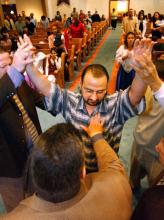
A new survey of Hispanic political and religious values finds they’re overwhelmingly Democrats who hold a largely negative view of the Republican Party.
The 2013 Hispanic Values Survey of 1,563 Hispanic adults was conducted online in both English and Spanish between Aug. 23 and Sept. 3. It has a margin of error of plus or minus 3.7 percentage points.
The survey found that most Hispanics are delighted with Argentine-born Pope Francis, but they hold slightly less favorable views of the Catholic Church. While nearly 69 percent look favorably on the pope, only 54 percent see the institution in a favorable light.

Federal officials have asked the U.S. Supreme Court to review the government mandate that private companies offer employees birth control coverage despite the business owner’s moral objections, with the company at the center of the suit owned by billionaire evangelical Christians.
Hobby Lobby’s lawsuit has been one of the most high profile of 60-some cases involving the Obama administration’s contraceptive mandate. The arts and crafts chain was founded by David Green, whom Forbes called “the biblical billionaire backing the evangelical movement.”
In June, the Obama administration issued final rules for the mandate that requires most employers to provide contraception at no cost. While there are exemptions for religious groups and affiliated institutions, there are no carve-outs for private businesses with religious owners.

Like most of the world last spring, I watched in fascination as Jorge Mario Bergoglio was elected pope. The first day, I was non-plussed. Another old, white guy? Big surprise. The second day, I began to take notice: he was a Jesuit and he chose the name Francis, the first pope ever to do so. The third day, I got a little discouraged as Catholic pundits and news organizations across the nation scrambled to prop up his conservative credentials and hardline stances. But as the week unfolded, I heard the stories of how he paid his own bills, carried his own bags, and rode in a modest sedan across town and my heart melted a little bit. Then came his ordination, and in one simple gesture, stopping to cradle a disabled man in his arms, he captured my imagination. I was willing to entertain the possibility that he just might be a different kind of pope.

Pope Francis on Thursday rocked the Catholic Church and surprised the wider world with a free-ranging interview that charted a course away from an institution that’s “obsessed” with a few sexual and moral issues and toward one that is more pastoral, less clerical and less doctrinaire.
But amid the widespread praise for his remarks – “Catholic is the new cool,” tweeted National Journal’s Ron Fournier – and some pointed criticism from the pontiff’s right flank, there lurks a critical, unanswered question: Can Francis make his vision for the church a reality?
More than detailing a list of reforms or policy change he hopes to make — which may yet happen, after time and extensive deliberations — the pope was sketching out a pastoral vision for the church, and modeling a way for clergy to speak and relate to their flocks.
In order to replicate that model, Francis needs enough time to appoint bishops who share his views and who can in turn encourage and promote like-minded priests and seminarians. In many ways, the type of change Francis envisions will take a generation or more.

VATICAN CITY — Of all the novelties that Pope Francis has brought to the Vatican, few have endeared him to the public — and unsettled his aides — as much as his penchant for picking up the phone and calling someone out of the blue.
The pontiff with the pastor’s touch has phoned his cobbler in Argentina to inquire about a shoe repair, called to cancel his newspaper subscription, and phoned a woman who was raped by a local police officer to counsel her.
Just this week, Francis phoned a pregnant Italian woman whose fiancé had pushed her to have an abortion.
Anna Romano instead dumped the guy, wrote to the pope about her problems, and on Sept. 3 received a surprise call from the Holy Father, who offered encouragement and even said he would baptize the baby if she couldn’t find a willing priest.
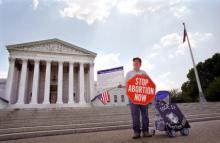
The war over abortion is going digital.
Missouri last month joined six other states that have enacted bans on abortion by telemedicine this year. That’s a process in which women take pregnancy-ending medication that a doctor remotely administers during a video conference.
The practice, available to women in their first nine weeks of pregnancy, is now prohibited in 11 states, according to the Guttmacher Institute, a research group that supports abortion rights.
In Iowa — where telemedicine abortions were pioneered — the Board of Medicine voted in June to effectively shut the practice down, and state legislators have declined to intervene in the dispute. A public hearing before the board is set for Aug. 28.
“Telemedicine is spreading across the country in chronic disease and mental health care, but abortion’s the only way we’re seeing it restricted,” said Elizabeth Nash, state issues manager at the Guttmacher Institute. “Whenever there’s an advancement in health care, an abortion restriction is never far behind.”

For Catholics—and many others—what happens in Rome doesn’t stay in Rome. The seating of a new pope has the power to affect believers across the globe, in ways direct, indirect, and unpredictable. And when a surprising sea change occurs in a hide-bound, steeped-in-tradition place like the Vatican—the unexpected resignation of a pope, the selection of a Jesuit from the Americas as his replacement, and the powerful symbolism of a new leader who literally stoops to wash a Muslim woman’s feet—people of faith of all traditions sit up and take notice.
In these early days of Francis’ papacy, we asked three prominent Catholic thinkers and leaders to help us understand what it all might mean. How will the spirit of reform that has marked Pope Francis’ first few months in office affect the worldwide church? Will change at the top trickle down to parishes and neighborhoods here in the United States and elsewhere? And what will Francis’ leadership mean not only for Catholics, but for all people of faith engaged in the work of making justice and building peace? —The Editors
CATHOLICS AROUND THE WORLD are transfixed by Pope Francis. We love his simplicity of life, his humble faith, his welcoming attitude to all, and his way of being Christian in the contemporary world that takes its bearings from the poor. Lace and gilt are no longer fashion statements at the Vatican. From his small apartment, the pope speaks bluntly about worrying less about rules and more about love. An utterly refreshing breeze blows through the Catholic Church.
But what does it really mean for Catholics today? The church still reels with the moral and spiritual damage done by members of the clergy as perpetrators or accomplices in the sex abuse scandals, from fiscal mismanagement, and from institutional infighting. Does Pope Francis change that? And what does the new pope signify for the young, for women, and for the many issues that vex the church’s engagement in today’s world?

This week an online ad informed me that Monsters University has finished first at the box office for two weeks running. I’m convicted by the statistic; I saw it somewhere between Northfield, Minn., and the Twin Cities on the “Largest Movie Screen in Minnesota” last week while visiting my brother. But it struck me that the movie presents – probably quite by accident – an opportunity to talk about a deep moral reality. So what follows will only begin obliquely by talking about cute monsters. And it will contain (mostly minor) spoilers. You’ve been warned.
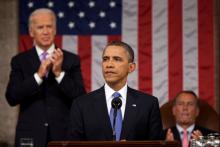
The Obama administration on Friday issued final rules for religious groups for its controversial contraception mandate, maintaining its position on who qualifies for religious exemption and allowing no carve-outs for private business owners.
More than 60 lawsuits have been filed over the mandate, a part of President Obama’s Affordable Care Act that requires most employers to provide contraception at no cost to employees.
Just as when the draft rules were first unveiled in February, conservatives denounced them as an unconstitutional violation of religious freedom that forces religious organizations and the religious owners of private businesses to offer services they find morally abhorrent.
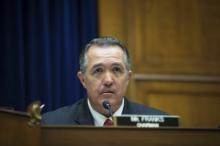
As the House debates a bill to limit abortion, Republicans are reopening a subject that cost them dearly in 2012 and continues to present perils for the party’s attempt to appeal to women voters.
Even before the full House took up the bill Tuesday to ban abortion after 20 weeks of pregnancy, Republicans had a sharp reminder of how sensitive the issue can be when Rep. Trent Franks, R-Ariz., appeared to say that rape rarely results in pregnancy.
“The incidence of rape resulting in pregnancy [is] very low,” Franks said at a June 12 committee hearing on the bill. Franks later said he meant that third-trimester abortions of pregnancies caused by rape are rare.

Now that the trial for abortion provider Kermit Gosnell has ended with a conviction, many are asking what public officials in Philadelphia plan to do with the 47 bodies from the case.
After Gosnell’s arrest in 2011, then-Archbishop Cardinal Justin Rigali asked the district attorney’s office for the bodies of the aborted fetuses. The bodies were being retained for the trial, but after it ended and Gosnell was sentenced to life in prison, his successor, Archbishop Charles Chaput, has renewed the request to bury the bodies.
Francis Maier, special assistant to Chaput, said that he doesn’t know whether or not a service would include a Catholic Mass, but he said it would be quiet and dignified.
A Philadelphia abortion doctor convicted of first-degree murder in the deaths of three babies will not face the death penalty.
Dr. Kermit Gosnell will serve life in prison without parole. He escaped the possibility of execution by agreeing Tuesday to waive his right to appeal his conviction of first-degree murder in the deaths of three babies. A jury on Monday found they were delivered alive and killed by snipping their spinal cords with surgical scissors.
During his trial, former employees of Gosnell’s rundown west Philadelphia clinic testified that he performed or tried to perform abortions beyond Pennsylvania’s 24-week gestation limit. Some procedures resulted in the birth of babies who appeared to be moving, breathing, and in one case, according to former employee Ashley Baldwin, “screeching.”
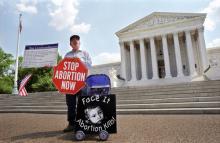
Even before rogue abortionist Kermit Gosnell was convicted in Philadelphia on Monday of delivering and then killing late-term infants, abortion opponents were convinced they had a case that could reshape an abortion debate that has remained static over the years.
After the verdict, they were even more confident.
“Dr. Gosnell is only the front man; and the real trial has only just begun. The defendant is the abortion license in America,” Robert P. George, a Princeton law professor and leading conservative activist, wrote after a jury convicted Gosnell of three counts of first-degree murder for snipping the spines of babies after botched abortions.
Gosnell, who could face the death penalty, was also found guilty of involuntary manslaughter in the death of a 41-year-old patient who sought an abortion at the squalid West Philadelphia clinic that prosecutors labeled a “house of horrors.”
Yet the fervent prayers for a game-changing impact from the Gosnell conviction may go unanswered for a variety of reasons.

American anti-abortion leaders will be in Rome on Sunday to participate in Italy’s third March for Life and lend their expertise to the nation’s small anti-abortion movement as it tries to learn from its American counterpart.
Jeanne Monahan, president of the March for Life Education and Defense Fund, and Lila Rose of Live Action will be among those who will march through central Rome on Sunday morning, from the Colosseum up to Castel Sant’Angelo, a few hundred meters from the Vatican.
While the annual March for Life in Washington — which celebrated its 40th anniversary in January — attracts hundreds of thousands of people and heavy media coverage, in Europe anti-abortion movements have often kept a lower profile and haven’t been able to shape social discourse as in the United States.
Polls regularly show high levels of support for abortion rights throughout Europe. A January poll by Eurispes found that 64 percent of Italians favor legalizing abortion pills.
In Italy, abortion is currently legal in hospitals up to the third month of pregnancy.
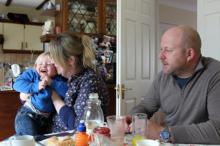
DUBLIN, Ireland — Ruth Bowie was in the throes of grief when she found out she would never know her unborn child. At the 12-week mark, a pregnancy scan showed the baby had anencephaly, a fatal condition in which a portion of the brain and skull never form.
Bowie, 34, a pediatric nurse, knew the implications of the birth defect even before the doctor explained. But the life-changing news didn’t stop there.
“The doctors said we will continue to look after you, or else you can choose to travel,” she recalled.
Put another way, if she and her husband wanted to seek an abortion, they would have to travel to England to end the pregnancy.
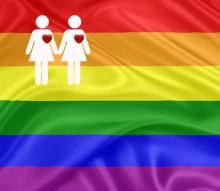
Five key Catholic bishops are opposing the newly authorized Violence Against Women Act for fear it will subvert traditional views of marriage and gender, and compromise the religious freedom of groups that aid victims of human trafficking.
The act, which was signed into law by President Obama on Thursday, is intended to protect women from domestic violence, sexual assault and human trafficking, and allows the federal government to spend money to treat victims and prosecute offenders.
That language disturbs several bishops who head key committees within the U.S. Conference of Catholic Bishops that deal with, among other issues, marriage, the laity, youth and religious liberty.But for the first time since the original act became law in 1994, it spells out that no person may be excluded from the law’s protections because of “sexual orientation” or “gender identity” — specifically covering lesbian, transgender and bisexual women.
JIM BALMER, president of an addiction-recovery center called Dawn Farm in Ypsilanti, Michigan, has been an antiwar activist since the Vietnam days. His engagement with nonviolence has taken him to some unexpected places, from the antiabortion group Operation Rescue to working with addicts. Sojourners associate editor Elizabeth Palmberg interviewed Balmer early last year at the Consistent Life conference in Washington, D.C.
Elizabeth Palmberg: What was your work for peace during the Vietnam war?
Jim Balmer: I had been part of Detroit-area draft resistance. I went through almost all the conscientious objector status [process]. And it was 1970—what can I tell you? I was under the influence of substances one night, and I wrote the draft board in Pontiac, Michigan, and told them off; I just said, "come and get me." They never did. I suspect that, as the '70s progressed, they got more and more tired of putting us in jail.
The Detroit-Ann Arbor area was a hub for political activism. Students for a Democratic Society was founded there. YPFJ—Youth for Peace, Freedom, and Justice—there were all sorts of organizations. We would protest. The first time I got actually picked up was at a George Wallace rally—Wallace was a terrible, racist candidate from Alabama.
I started being interested in nonviolence. I was reading Mohandas Gandhi and Martin Luther King Jr., and I took King's nonviolence pledge when I was in high school.
BETWEEN 2008 and 2009, the Centers for Disease Control reported in November, the U.S. abortion rate fell 5 percent, down to the lowest point that decade. This new data is drawing the attention of people of faith whose thinking about unwanted pregnancies has become more nuanced—both in how to prevent them and what to do when they occur.
Why did the rate drop? It's not a matter of people being more cautious about becoming pregnant due to the recession; along with the overall decline, the number of abortions per 1,000 live births also dropped. But it might be linked to the fact that use of long-acting contraceptives such as IUDs, which tend to be more effective than other methods, more than doubled from 2007 to 2009, according to a national survey.
In recent years, as evangelical activism has broadened, economic justice, creation care, and immigration reform have been at the forefront of the change—but abortion hasn't. Of evangelicals, 61 percent believe abortion should be illegal in all or most cases, while 33 percent say it should be legal; 84 percent of evangelicals ages 18 to 30 say they would not consider abortion if faced with an unexpected pregnancy.
While 77 percent of those young evangelicals find premarital sex unacceptable, they are also aware of facts on the ground, perhaps because they think seriously about human fallenness. Eighty-two percent, perhaps with the awareness that more-effective birth control would reduce abortion rates further, hold that those having "sex outside of marriage should use contraceptives to prevent pregnancy." (An increasing number of Catholics hold similar views, despite current church teaching.)